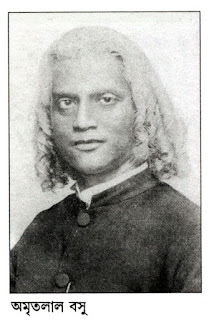Basu, Amrita Lal (1853-1929) dramatist and actor, born in Kolkata. He
was one of the pioneers of the nineteenth-century public theatre in
Bengal. After passing the Entrance examination from Calcutta General Assembly's
Institution, he was admitted to Medical College, but, after two years of study,
dropped out to study homeopathy. For a short time he practised homeopathy in
Kolkata, but soon turned to acting and writing plays
The famous script writer and player Amritalal Basu saw the performance on the first day, 25th Aug. His long article on this drama titled " Visarjan - An appreciation"was published in The Indian Daily News on 4th Sept. he wrote;
" On Saturday last I went to see the performance of Rabindranath's Visarjan produced at the "Empire" under the author's direction, himself taking a leading role.
Few actors know how to make their entrances and exits.Babu Dinendranath Tagore, as the high priest of the Holy Mother's Temple, entered and, before he uttered a single word, we knew that the genius of an actor was in him.....
Next comes the little lady in the character of Aparna, the beggar girl. As everything on the stage must be counterfeit, a real Ranee was chosen to represent a beggar, the ducking glides in and out of the stage as if the board were her play-pond; naive in speech, artless in manner, how sweetly she laid her virgin cheek on the step-stone to cares her pet, her stolen and slain kid, the acting heart murmuring soft words soaked in tears.
After the officers have preceded comes the General. The Rabindranath, born great, he has achieved greatness and greatness courts him, too. The great poet is a great actor, almost a mater of the technique of stagecraft. but young aspirants to histrionic fame, beware of the great master ! As in poetry one must drink at the fountain of Rabindranath's mind and not simply borrow his words, so on the stage, one should imbibe the spirit of his acting and not imitate him in action, attitude, gesture or pose. They are all his own, and the copyright is not to be infringed.
In endowing Rabi Babu with a great mind. Providence seems to have prepared a special mould to cst the golden casket in which that mind was to find its home. There is, in the masculine frame of Rabindranath, such a judicious admixture of the faminine, that the product almost approaches the Divine. He sighs, murmurs, wails, kneels, claps his hands, draws out his long vowels; and we feel that the woman peeps out without making efferminate the poetry of his presentation ....
Not in the plot but in the play was an angelic figure who came and went, justifying her own musical name by her sweet songs...
The play succeeded without any external aid. It was one continuous current of acting , without division into scenes or acts. No display of colour in wings, borders or back-scene. One looked on the neutral-tinted cloth before one's eyes, and imagination did the rest. "
The famous script writer and player Amritalal Basu saw the performance on the first day, 25th Aug. His long article on this drama titled " Visarjan - An appreciation"was published in The Indian Daily News on 4th Sept. he wrote;
" On Saturday last I went to see the performance of Rabindranath's Visarjan produced at the "Empire" under the author's direction, himself taking a leading role.
Few actors know how to make their entrances and exits.Babu Dinendranath Tagore, as the high priest of the Holy Mother's Temple, entered and, before he uttered a single word, we knew that the genius of an actor was in him.....
Next comes the little lady in the character of Aparna, the beggar girl. As everything on the stage must be counterfeit, a real Ranee was chosen to represent a beggar, the ducking glides in and out of the stage as if the board were her play-pond; naive in speech, artless in manner, how sweetly she laid her virgin cheek on the step-stone to cares her pet, her stolen and slain kid, the acting heart murmuring soft words soaked in tears.
After the officers have preceded comes the General. The Rabindranath, born great, he has achieved greatness and greatness courts him, too. The great poet is a great actor, almost a mater of the technique of stagecraft. but young aspirants to histrionic fame, beware of the great master ! As in poetry one must drink at the fountain of Rabindranath's mind and not simply borrow his words, so on the stage, one should imbibe the spirit of his acting and not imitate him in action, attitude, gesture or pose. They are all his own, and the copyright is not to be infringed.
In endowing Rabi Babu with a great mind. Providence seems to have prepared a special mould to cst the golden casket in which that mind was to find its home. There is, in the masculine frame of Rabindranath, such a judicious admixture of the faminine, that the product almost approaches the Divine. He sighs, murmurs, wails, kneels, claps his hands, draws out his long vowels; and we feel that the woman peeps out without making efferminate the poetry of his presentation ....
Not in the plot but in the play was an angelic figure who came and went, justifying her own musical name by her sweet songs...
The play succeeded without any external aid. It was one continuous current of acting , without division into scenes or acts. No display of colour in wings, borders or back-scene. One looked on the neutral-tinted cloth before one's eyes, and imagination did the rest. "
